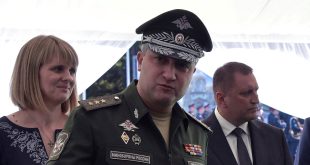Shortly after his conviction in 2011 on charges including conspiring to kill American citizens, the Russian arms dealer Viktor Bout relayed a defiant message through his lawyer as he faced the prospect of decades in prison.
Mr. Bout, his lawyer said, “believes this is not the end.”
More than a decade later, Mr. Bout, 55, has been freed, despite serving less than half of his 25-year prison sentence. He was exchanged on Thursday for the American basketball star Brittney Griner, who had been imprisoned in Russia for 10 months.
Russian officials had pressed for Mr. Bout’s return since his conviction by a New York jury on four counts that included conspiring to kill American citizens. Prosecutors said he had agreed to sell antiaircraft weapons to drug enforcement informants who were posing as arms buyers for the Revolutionary Armed Forces of Colombia.
The attorney general at the time, Eric Holder, called Mr. Bout (pronounced “Boot”) “one of the world’s most prolific arms dealers.” Mr. Bout become notorious among American intelligence officials, earning the nickname “Merchant of Death” as he evaded capture for years. His exploits helped inspire a 2005 film, “Lord of War,” that starred Nicolas Cage as a character fashioned after Mr. Bout.
He was probably the highest-profile Russian in U.S. custody and the prisoner Russia had campaigned the most vociferously to have returned. His return to Russia is likely to reignite the debate over the wisdom of engaging in prisoner exchanges for Americans the United States considers “wrongfully detained” — as was the case with Ms. Griner and is with another American still imprisoned in Russia, Paul Whelan, a former Marine.
In interviews with journalists, Mr. Bout has repeatedly denied accusations that he has worked for Russian intelligence agencies. But Mark Galeotti, an expert on Russia’s security services, said there were strong signs — Mr. Bout’s education, his social and professional networks, and his logistical skills — that he is a member, or at least was in close collaboration with, Russia’s military intelligence agency, known as the G.R.U.
“That is also the opinion of U.S. and other authorities — and it explains the reasons Russia has been so assiduously campaigning to get him back,” Mr. Galeotti, a lecturer on Russia and transnational crime at University College London, said in an interview in July. “All countries try to get their citizens out of rough jurisdictions, but it is clear that it has been a particular priority for the Russians in getting Viktor Bout back.”
Mr. Bout grew up in Dushanbe, the capital of Tajikistan, until his conscription into the Soviet military at age 18. After a term in the Army, he studied Portuguese at the Military Institute of Foreign Languages in Moscow, a common entree to Russian intelligence services, and eventually became an officer in the Air Force.
The Soviet Union broke apart not long after Mr. Bout left the military. As Russia’s economy collapsed and criminal groups thrived, he moved to the United Arab Emirates and started a cargo company that grew to a fleet of 60 planes.
With military supplies of former Soviet states leaking onto the black market, his shipping empire delivered guns to rebels, militants and terrorists around the world, prosecutors said. In the new era of privatization in Russia, arms traffickers were able to use old Soviet-era social, military and business networks, and to also develop shell companies to hide transactions.
Mr. Bout was accused of selling weapons to Al Qaeda, the Taliban and militants in Rwanda. According to several investigations and his U.S. indictment, he and his associates flouted arms embargoes in Sierra Leone, the Democratic Republic of Congo and Algeria, where he sold weapons to both the government forces and the rebels fighting them.
His ability to avoid being captured added to his notoriety among Western intelligence officials. In 1995, the Taliban forced down one of his planes in Afghanistan and seized the cargo and imprisoned the crew. Mr. Bout and Russian officials somehow managed to get the crew out of the country: In 2003, he told The New York Times Magazine “they were extracted,” and in 2012, The New Yorker reported, he said they simply escaped.
U.S. authorities finally caught up with him in Bangkok in 2008. Mr. Bout met with undercover Drug Enforcement Administration agents he believed represented rebels from Colombia’s Revolutionary Armed Forces, or FARC, which the United States considered a terrorist organization until last year.
When the prospective buyers told him the weapons could be used to kill American pilots, Mr. Bout responded, “We have the same enemy,” prosecutors said.
Thai authorities arrested him on the spot. He was extradited to the United States in 2010 and two years later was sentenced to 25 years.
In the years since, Russian authorities have maintained Mr. Bout’s innocence and brought him up as a possible swap for other high-profile American and Ukrainian detainees held by Russia. He has been at the center of a Russian campaign, “we don’t abandon our own,” that has cast his arrest as unfair and politically motivated.
Mr. Bout’s exchange has been a priority for Russia “a matter of honor and a matter of ruthless pragmatism,” said Mr. Galeotti, the Russia expert.
Russian intelligence agencies “have inherited from the former Soviet K.G.B. a culture that makes it clear to its own agents — ‘we will get you back.’ That kind of loyalty to your own is really important when you are expecting people to put themselves potentially in harm’s way.”
It was unclear whether Mr. Bout’s return would further encourage Russia to arrest Westerners who can be traded; Moscow denies allegations that it intentionally arrests people to force an exchange.
Andrei Soldatov, a Russian journalist and expert on the security services who is a senior fellow at the Center for European Policy Analysis, said that while Mr. Bout had been the highest profile Russian prisoner in America, there were many more Russians in U.S. prisons, particularly for hacking.
The Russian authorities, Mr. Soldatov said, learned how to “create banks of hostages” in the early 2000s during a brutal war with the breakaway region of Chechnya, right after President Vladimir V Putin came to power.
“It was a lesson they never quite forgot,” said Mr. Soldatov. Referring to Russian security agencies, he said, “It makes total sense, from their point of view to do the same with the U.S.”
Ivan Nechepurenko contributed reporting.
 Top Naija News: Nigerian News, Breaking News Nigeria and World News Top Naija News is a daily news publication in Nigeria, delivering the latest breaking news in Nigeria and around the world.
Top Naija News: Nigerian News, Breaking News Nigeria and World News Top Naija News is a daily news publication in Nigeria, delivering the latest breaking news in Nigeria and around the world.



